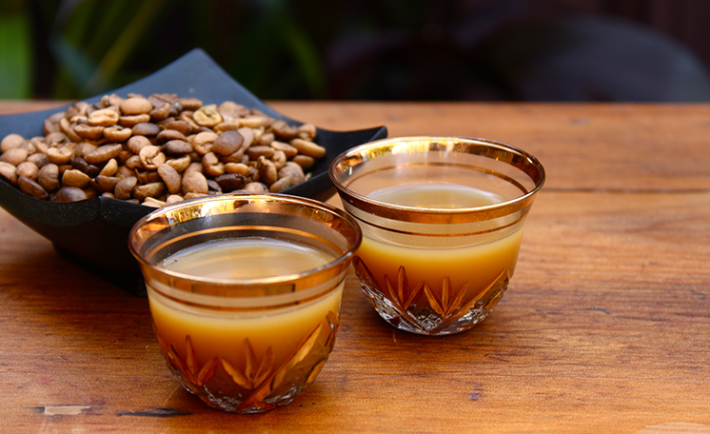Arabic coffee can be categorized into two: Al-Qahwa which is Saudi coffee, and the Turkish-style coffee. While Qahwa is prepared using roasted beans with added spices, Turkish coffee is made with finely ground coffee beans.
Both coffee beans are easily available in Arab hypermarkets, online stores and even in shopping malls. Whilst shopping for your coffee beans you might want to pick up ‘Dallah’ the traditional pot in which Qahwa is made. A variety of other items such as cardamom, cloves, and saffron, in addition to coarsely grounded Arabic coffee beans, are optional add ons and can be used to make a delicious cup of coffee.
The best way to make Arabic Coffee (Qahwa) is, to first, pour 3 cups of water in the coffee pot and wait for the water to boil. Next, once the water is boiling, add a tablespoon of coffee beans and let it cook again for 10 to 15 minutes, over low flame. Then, add cardamom and cloves. After ten minutes, take it out from the heat and allow the grounded coffee beans to settle down. Finally, strain and transfer the steaming coffee into a thermos flask to keep the coffee hotter for a certain amount of time.
Usually, any Arabic Coffee is served in small cups called “Finjal”, in order to be generous with the invitee, the host should spill a small amount of the coffee in the bottom of the Finjal. It is common in the Arabian culture that the oldest guest is served first, custom dictates that one can’t decline Qahwa when offered, the cup must only be a quarter full and once finished, one should shake the cup gently as a sign for no more so it can then be refilled. Qahwa is very bitter, and typically has no sugar added, and which is why it is usually served with dates and sweets.
Information and civilizations are passed on within the family through reflection and repetition. Young family members also accompany their elders to the market to learn how to choose the top-class coffee beans. Drinking Arabic coffee is an integral part of Saudi culture and the Gulf region as it is usually consumed daily and is an essential part of special occasions and parties. Arabic coffee was introduced by Bedouin tribes in the 15th century and continues to be a necessary part of a tradition in the Gulf until now.










